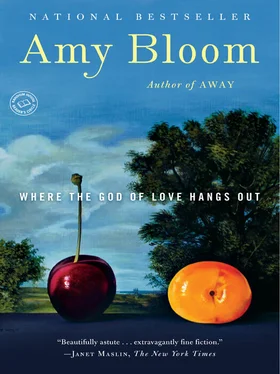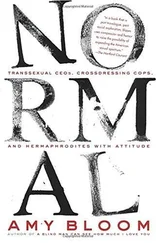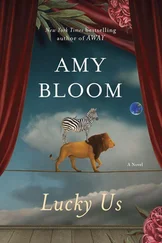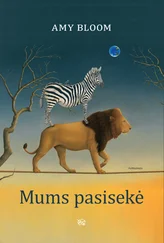“You’re up early. The Band-Aids are in my bath room.” Her fingertip is throbbing like a heart, and Julia keeps it aloft. It’s been a long time since anyone has told her to do anything.
Her bathrobe always lies at the foot of the bed. There is always a pale-blue quilt, and both nightstands are covered with books and magazines and empty tea cups. The room smells like her. Lionel takes the Band-Aids from under the sink: styling mousse, Neosporin ointment (which he also takes), aloe-vera gel, Northern Lights shampoo for silver hair, two bottles of Pepto-Bismol, a jar of vitamin C, zinc lozenges, and a small plastic box of silver bobby pins.
When he comes down, Julia is holding her finger up, still pointing to God, in the most compliant, sweetly mocking way.
“I hear and obey,” she says.
“That’ll be the fucking day.”
Lionel slathers the antibiotic ointment over her finger, holding the flap of skin down, and wraps two Band-Aids around it. It must hurt like holy hell by now, but she doesn’t say so. With her good hand, Julia pats his knee.
“I was going to make coffee,” she says, “but I think you’ll have to.” And even after Jewelle and Buster get up for the kids’ breakfast and exclaim over the finger and Jewelle prepares to run the show, Lionel stays by Julia, changing the red bandages every few hours, mocking her every move, helping her with each dish and glass as if he were some fairy-tale combination of servant and prince.
At one o’clock, after Peter has called to say that he is too sick to come and everyone in the kitchen hears him coughing over the phone, they all go upstairs to change. They are not a dress-up family (another thing Jewelle likes, although she can hear her mother’s voice suggesting that if one so disdains the holiday’s traditions, why celebrate it at all), but the children are in such splendid once-a-year finery that it seems ungracious not to make an effort. Corinne wears a bronze organdy dress tied with a bronze satin sash, and ivory anklets and ivory Mary Janes. Julia knows this is nothing but nonsense and conspicuous consumption, but she loves the look of this little girl, right down to the twin bronze satin roses in her black hair, and she hopes she will remember it when Corinne comes to the dinner table ten years from now with a safety pin in her cheek or a leopard tattooed on her forehead. And Jordan is in his snappy fawn vest and white button-down shirt tucked into his navy-blue pants, and an adorable navy-blue- and-white-striped bow tie. Lionel and Buster are deeply dapper; their father appreciated Italian silks and French cotton, took his boys to Brooks Brothers in good times and Filene’s Basement when necessary, and made buying a handsome tie as much a part of being a man as carrying a rubber or catching a ball, and they have both held on to that. Jewelle has the face and the figure to look good in almost everything, but Julia herself would not have chosen tight black satin pants, a turquoise silk camisole cut low, and a black satin jacket covered with bits of turquoise and silver, an unlikely mix of Santa Fe and disco fever. Julia comes downstairs in her usual holiday gray flannel pants and white silk shirt. She has turned her bathroom mirror, her hairbrushes, and her jewelry box over to Jewelle and Corinne.
“Do you mind Peter’s not coming?” Buster says.
“Not really.”
Lionel looks at her. “You must miss Pop,” he says.
“Of course, honey. I miss him all the time.” This is not entirely true. Julia misses Lionel senior when she hears an alto sax playing anything, even one weak note, and she misses him when she takes out the garbage; she misses him when she sees a couple dancing, and she misses him every time she looks at Buster, who has resembled her for most of his life, with his father apparent only in his curly hair, and now looks almost too much like the man she married.
Buster puts his arm around her waist. “You must miss Peaches, too.” He’d met Peaches only a few times when she was well and charming, and a few more when she was dying, collapsed in his mother’s bed like some great gray beast, all bones and crushed skin, barely able to squeeze her famous voice out through the cords.
Julia would like to say that missing Peaches doesn’t cover it. She misses Peaches as much as she missed her stepson during his fifteen-year absence. She misses Peaches the way you miss good health when you have cancer. She misses her husband — of course she misses him and their twelve years together — but that grief has been softened, sweetened by all the time and life that came after. The wound of Peaches’s death has not healed or closed up yet; at most the edges harden some as the days pass. She opens her mouth now to say nothing at all about her last love; she thinks that even if Lionel is all wrong about what kind of man Peter is, he is fundamentally right. Peter is not worth the effort.
“I do miss Peaches, too, of course.”
Lionel has all of Peaches Figueroa’s albums. On the first one, dark-blond hair waves around a wide bronze face, one smooth lock half covering a round green eye heavily made up. Black velvet wraps low across her breasts, and when Lionel was nineteen it was one of the small pleasures of his life to look at the dark-amber crescent of her aureole, just visible above the velvet rim, and listen to that golden, spilling voice.
“I’m sorry I didn’t meet her.” Lionel would like to ask his mother what it was like to go from a man to a woman, whether it changed Julia somehow (which he believes but cannot explain), and how she could go from his father and Peaches Figueroa, both geniuses of a kind, to Peter down the road, who sounds to Lionel like the most fatiguing, sorry-assed, ready-for-the-nursing home, limp-dick loser.
Julia raises an eyebrow and goes into the kitchen.
The men look at each other.
“We could open the wine,” Lionel says. “You liked her, didn’t you?”
“I really liked her,” Buster says. He does not say, She scared the shit out of Jewelle, but she would have liked you, boy. She liked handsome, and she knew we all have that soft spot for talent, especially musical talent, and that we don’t mind, we have even been known to encourage, a certain amount of accompanying attitude. Peaches had been Buster’s favorite diva.
“Open the wine up. You let those babies breathe. I’ll get everyone down here.”
“It might be another half hour for the turkey,” Jewelle says. “Sorry.”
“Don’t worry, honey.” Buster eats one of Corinne’s peanut-butter-stuffed celery sticks.
“Charades?” Julia says, putting out a small bowl of nuts and a larger one of black and green olives. Charades was their great family game, played in airports and hotel lobbies, played with very small gestures while flying to Denmark every summer for the Copenhagen jazz festival, played on Amtrak and in the occasional stretch limo to Newport, and played expertly by Lionel and Buster whenever the occasion has arisen since. Corinne and Jordan don’t know what charades is, but Grandma Julia has already taken them back to the kitchen and distributed two salad bowls, six pencils, and a pile of scrap paper. Corinne will act out The Cat in the Hat , and Jordan will do his favorite song, “Miami.” Corinne practices making the hat shape and stepping into it while Jordan pulls off his bow tie and slides on his knees across the kitchen floor, wild and shiny and fly like Will Smith. They are naturals, Julia thinks, and thinks further that it is a ridiculous thing to be pleased about — who knows what kind of people they will grow up to be? — but she cannot help believing that their mostly good genes and their ability to play charades are as reasonable an assurance of future success as anything else.
No one wants to be teamed with Jewelle. She is smart about many things, talented in a dozen ways, and an excellent mother, and both men think she looks terrific with the low cups of her turquoise lace top ducking in and out of view, but she’s no good at charades. She goes blank after the first syllable and stamps her foot and blinks back tears until her time is up. She never gets the hard ones, and even with the easiest title she guesses blindly without listening to what she’s said. Jewelle is famous for “Exobus” and “Casabroomca.”
Читать дальше












